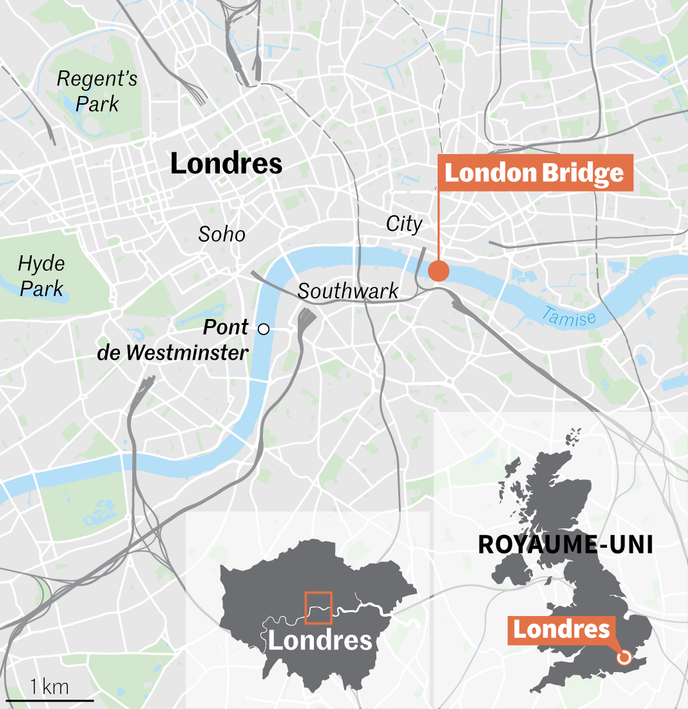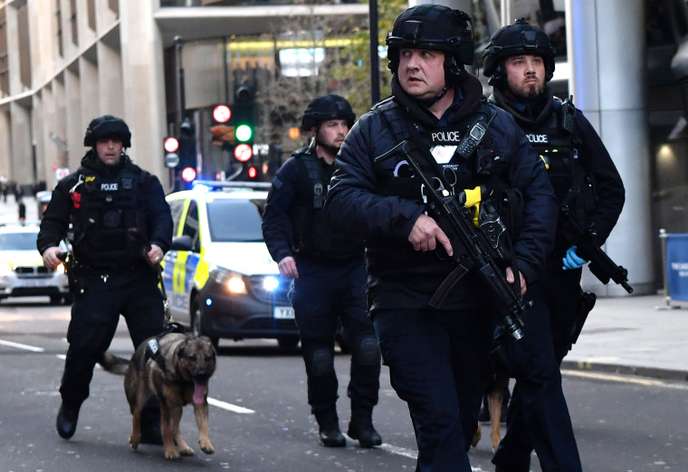
An attack described as "Terrorist" took place on Friday, November 29, on the iconic London Bridge in the heart of London, an area full of tourists and executives went out for lunch. It has rekindled in the British the painful memory of the series of attacks that took place in almost the same place, in June 2017.
In the early afternoon, a man, who will be told hours later that he was carrying an explosive belt, was shot dead by police after killing two people with knives. man and a woman – and injured three others near Fishmongers'Hall, a historic building north of the bridge. In the night, the police will announce that his name was Usman Kahn, he was 28 years old, and that he was released from prison in December 2018, after spending eight years in terrorism detention.
In 2012, he pleaded guilty, having raised funds for terrorism-related activities, and planned to establish a training camp in Pakistani Kashmir. He was part of a gang of nine extremists from Stoke-on-Trent, Cardiff and London all convicted. Khan was 19 at the time and he was the youngest in the group. At the time of his conviction, the judge stated that Khan and two other men of the gang were "Dangerous jihadists".
"Extraordinary Courage"
Khan was also suspected of having attacked the London Stock Exchange, the London Stock Exchange, by placing a bomb in the building's washroom. The group also reported attacks on pubs, the US embassy, as well as personalities such as Boris Johnson, then mayor of the capital, the dean of St. Paul's Cathedral and two rabbis.
Usman Kahn wore an electronic bracelet and was scheduled to attend a rehabilitation conference after a prison term at Fishmongers' Hall. This is where the attack began Friday, just before 14 hours. Passersby who partially controlled it included a fire extinguisher and a 1.5 m narwhal defense seized in the historic building (the seat of a former fish merchant guild).

On June 3, 2017, a ram had first struck passersby at night on the London Bridge, then three men stabbed others at Borough Market on the south bank of the Thames, killing in all eight people, before being killed by police. The terrorists also wore false belts of explosives. As in 2017, Friday's attack comes in the middle of the campaign for the December 12 general election.
British Prime Minister Boris Johnson hailed "Extraordinary courage" passersby who intervened, almost at the same time as the police, to try to disarm the murderer; "They represent the best of our country, and I thank them on behalf of us all." He also announced that he was suspending his campaign, " for the evening ", and for a part of the next day.
"Brutal reminder"
Labor Party leader Jeremy Corbyn was also scheduled to suspend his campaign for the evening, "Out of respect for the victims". He stressed, as his main political opponent, the courage "Police, emergency services and members of the public who have put themselves in danger to protect others. We must remain united and can not let the democratic process be disrupted by terrorist acts ".
"These passersby have done exactly what they are advised against (go to the danger), but they saved lives, Chris Phillips, a former police officer and anti-terrorism expert, interviewed BBC on Friday night.

The level of alert bombing had just been lowered in the country, in early November, from " severe " at " substantial. " "In the coming days, more police, armed and unarmed, will patrol London to reassure people," announced Cressida Dick, Commissioner of the London Metropolitan Police.
This attack is "A brutal reminder of the dangers and various threats that we continue to face", estimated Tobias Ellwood, Theresa May's former Counter-Terrorist Minister, serving during the 2017 attacks. More than 20 terrorist attacks have been thwarted in London since the 2017 attacks, Sadiq Khan said. Mayor of London.




